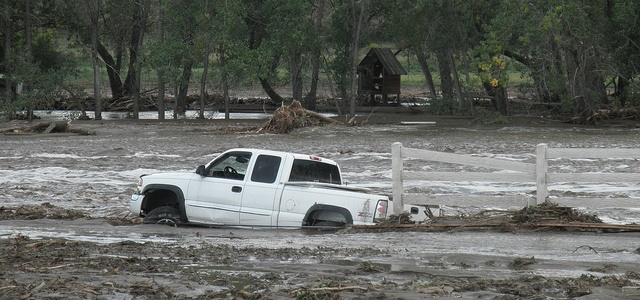 The recent flooding in Colorado, in which eight people died and property losses are likely to reach $2 billion, offers another reminder that local law enforcement efforts are often hindered by our broken immigration system. The Denver Post reported that some unauthorized immigrants risk injury or miss out on assistance because they are afraid to interact with police. For example, Augustina Tema’s husband, who is an unauthorized immigrant, was afraid to come outside when police officers went door-to-door to warn residents of the pending flood. Augustina, a legal resident, expressed fear of applying for assistance because of her husband’s status, a fear other undocumented families echoed. For the undocumented families, the tragedy of losing their homes to flooding is compounded by the loss of their “paper trail”—materials that would be needed to prove residency for any future legalization programs. Disaster-related documentation problems extend to those legally residing in the United States if the papers that prove an immigrant may legally live and work in the United States are lost as well, further hindering emergency assistance.
The recent flooding in Colorado, in which eight people died and property losses are likely to reach $2 billion, offers another reminder that local law enforcement efforts are often hindered by our broken immigration system. The Denver Post reported that some unauthorized immigrants risk injury or miss out on assistance because they are afraid to interact with police. For example, Augustina Tema’s husband, who is an unauthorized immigrant, was afraid to come outside when police officers went door-to-door to warn residents of the pending flood. Augustina, a legal resident, expressed fear of applying for assistance because of her husband’s status, a fear other undocumented families echoed. For the undocumented families, the tragedy of losing their homes to flooding is compounded by the loss of their “paper trail”—materials that would be needed to prove residency for any future legalization programs. Disaster-related documentation problems extend to those legally residing in the United States if the papers that prove an immigrant may legally live and work in the United States are lost as well, further hindering emergency assistance.
Similar stories followed Hurricane Sandy, where the Mexican consulate estimated that 380 of its citizens in New York and New Jersey suffered losses, which they shouldered without support. Many undocumented immigrants think they are not eligible for assistance. While they are not eligible for cash assistance, FEMA encourages undocumented immigrants to register for assistance because other benefits may be available to them, including transportation, emergency health care, food, and water. Families with a U.S.-born child may be eligible for full FEMA assistance. The community outreach in emergency situations and the lack of awareness of what benefits may be available to them is compounded by language issues when warnings and evacuation notices are not issued in the language of the immigrant community.
When Hurricane Sandy struck the Northeast, ICE and CBP issued a joint statement in several languages emphasizing that “there will be no immigration enforcement initiatives associated with evacuations or sheltering related to Sandy.” However, as we noted at the time, there is often a disconnect between official pronouncements and on the ground actions. After Sandy, we asserted the need to support policies that emphasize public safety over immigration enforcement. While there has not been a similar press release for the Colorado flooding, FEMA spokesperson Jerry DeFelice told media sources that FEMA will protect the privacy of all flood victims. Instead, a blanket DHS policy that would apply to natural disasters like the Colorado flooding and Hurricane Sandy would be useful in effectively evacuating communities in the face of disaster. Fear of deportation should not stand in the way of community safety, and there is still the need for policies that emphasize public safety.
How community members react to local police officers within the context of disaster relief further underscores the importance of keeping immigration enforcement efforts separate from local officers and disaster relief. Mixing enforcement with the day-to-day duties of local officers hinders community safety if people fear deportation. This is something law enforcement officers around the country have expressed in their opposition to legislation such as the SAFE Act, which puts the burden of immigration enforcement on them. The Major Cities Chiefs Association called efforts to bring local police into immigration enforcement a “misguided approach” that “will make all of our communities less safe.” Research from the University of Illinois reinforces their opposition. The report found that the mistrust of law enforcement authorities among Latinos, documented or otherwise, has led to a reduction in public safety. This distrust of local law enforcement is never more apparent than when a community is struggling to save lives in the face of a natural disaster.
FILED UNDER: Colorado, Customs and Border Protection, enforcement, Immigrants and Natural Disasters, Immigration and Customs Enforcement, undocumented immigration, USCIS


